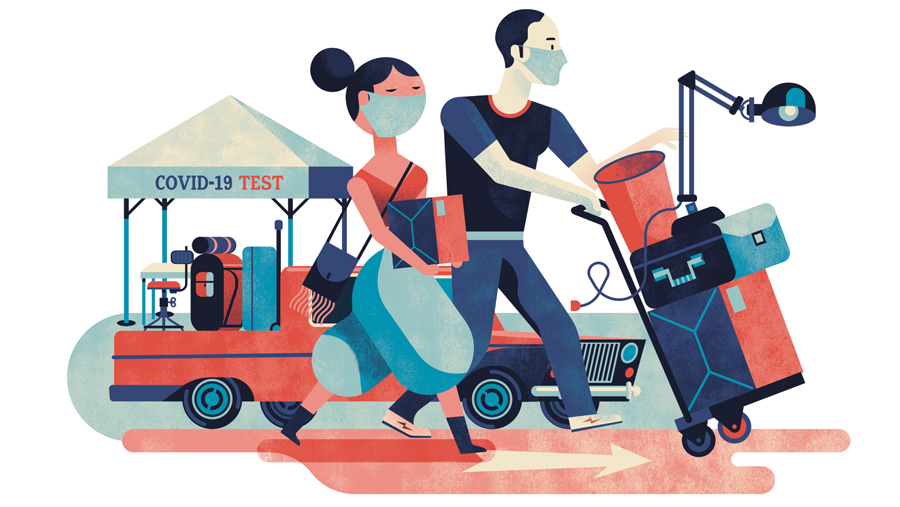during move-in week
Twenty-one years later, on this fall’s move-in day, the rain was absent but so were the helpers. Because of the pandemic, each student could select just one family member to help carry belongings inside.
The changes didn’t end there. Face coverings were mandatory. Move-in day became move-in week with students registering in two-hour windows spread across five days. And before receiving a room key, students were required to provide proof of two successive negative COVID-19 tests.
But even with all those changes, the sense of excitement and belonging Alexander remembered hadn’t vanished. It just took a lot more work to create. And it required a legion of staff volunteers stepping up and stepping out of their normal roles.
Alexander, an associate head track and field coach, was one of the dozens of employees who volunteered to direct traffic, greet families, conduct health screenings and distribute room keys.
“I figured it was all hands on deck,” Alexander says. “There is an excitement about getting on campus, and I was just trying to be a smiling, happy face — underneath the mask, at least.”
Alexander took four of the 110 available shifts — 22 per day across five days. Jennifer Albright, student affairs operations administrator, remembers worrying about understaffing. She had the opposite problem.
“Many times, I had to tell folks that the shift they signed up for was already full,” she says. “Our community was so excited and willing to do whatever was needed to welcome our students back.”
Students seemed ready to do their part, too, says Web Developer Tristan Scott, who worked a trio of three-hour shifts.
“There was an attitude of, ‘I will do anything to be here,’ ” he says. “One student said she had friends at other colleges and mentioned that Bucknell was the only one really trying its hardest to let people on campus.”
“Trying its hardest” meant navigating logistical labyrinths. As assistant director of Bucknell’s Events Management team, Heather Dawson is used to doing just that for big events such as Homecoming, Commencement and Reunion.

“Every day we said, ‘OK, it can’t change from here.’ But every day it changed because there was something new that someone found out,” she says. “So I gathered the information and came up with a new diagram. I was just doing my job. Everyone stepped up and was happy to see the students come back.”
Once students settled into their rooms, attention turned to the team of 100 residential advisers.
In a normal semester, RAs serve as role models, connect residents with resources and enforce policies. But in fall 2020, they took on another role: educating fellow students about the virus.
“I’m coming to them as an adult, like, ‘Look, put your mask on, because it’s not just about you at this point. It’s about other people’s health as well,’ ” says Bryanni Williams ’23, an RA in Vedder Hall. “Because we all have that thought in mind, it wasn’t too much of a challenge.”
Sam Barnes ’23 took a similar approach with his residents in Swartz Hall.
“I’ve been approaching it as, ‘It’s bigger than you,’ ” he says. “I always make sure that they realize how much of a privilege it is to be on the Bucknell campus, because it’s a relative rarity [to take classes on a campus this fall], not just in the nation, but in the world.
“I do so much better on campus,” Barnes adds. “I get to interact with people. I get to see my professors and make connections. That’s how I work. I’m so grateful for all of the efforts that Bucknell has put in, because it’s keeping us here.”